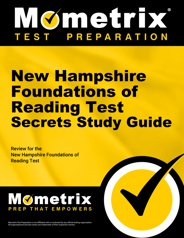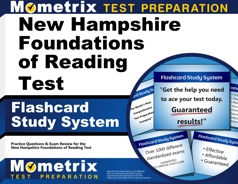If you are considering a career as a teacher for grades K-6 or a special education teacher for grades K-12 in the state of New Hampshire, the New Hampshire Foundations of Reading exam is in your future!
Click “Start Test” above to take a free New Hampshire Foundations of Reading practice test, and check out our premium-quality New Hampshire Foundations of Reading test prep resources by clicking the links below!
Exam Outline
The New Hampshire Foundations of Reading (190) exam is made up of 100 multiple-choice questions and two open-response questions, and you will be given a time limit of 4 hours.
The questions are spread out among four sections.
I. Foundations of Reading Development (35%)
This section contains between 43 and 45 multiple-choice questions and accounts for 35% of the exam.
You will be tested on four objectives throughout this section:
- Objective 1: Language development and literacy skills, including the alphabetic principle, phonemic and phonological awareness, and print concepts
- Objective 2: Development of reading skills in beginners, including phonics, spelling, and high-frequency vocabulary
- Objective 3: Word analysis skill-development and strategies, including orthographic skills, syllabication, structural analysis, and morphemic analysis
- Objective 4: Development of reading fluency at every stage of reading development
II. Development of Reading Comprehension (27%)
This section contains between 33 and 35 multiple-choice questions and accounts for 27% of the exam.
You will be tested on three objectives throughout this section:
- Objective 1: Promoting the development of academic language, including the development of academic vocabulary
- Objective 2: Promoting the analysis and comprehension of literary texts
- Objective 3: Promoting the analysis and comprehension of informational texts
III. Reading Assessment and Instruction (18%)
This section contains between 21 and 23 multiple-choice questions and accounts for 18% of the exam.
You will be tested on two main objectives throughout this section.
- Objective 1: Best practices for assessing the development of reading
- Objective 2: Best practices of general reading instruction
IV. Integration of Knowledge and Understanding (20%)
This section contains open-response questions and accounts for 20% of the exam (each question accounts for 10%).
Item 1
For this question, you will be asked to prepare a developed and organized analysis on a topic that relates to the development of foundational reading skills.
Here are some further details on what you may be asked to do:
- Review an assessment of foundational reading skills for a student. You will need to analyze the information, interpret the meaning of the assessment, and be able to discuss the results in an organized and developed manner.
- Use your knowledge and skills to choose examples provided in a reading performance to identify the strengths the student has and what foundational reading skills they need to have more instruction in. These skills may include phonics, phonemic awareness, reading fluency, morphemic analysis, and more.
- Select and describe what instructional strategy would be most beneficial to a student based on their strengths and identified need for additional foundational reading skills instruction. You will need to apply sound reasoning and knowledge of the foundational reading skills to create an instructional strategy with activities, interventions, and more.
Item 2
For this question, you will be asked to prepare a developed and organized analysis on a topic that relates to the development of reading comprehension.
Here are some further details on what you may be asked to do:
- Select appropriate examples from the reading performance of a student that demonstrate their strengths in comprehension. The comprehension strengths may lie in vocabulary, the ability to determine key ideas or details, their application of English grammar, their knowledge of academic language structures, and more.
- You may have to review an evaluation of reading comprehension for a student and use your knowledge and skills to analyze and interpret the assessment so you can discuss it in an accurate and organized manner.
- Select and describe what instructional strategy would be most beneficial to a student based on their strengths and identified need for additional foundational reading skills instruction. You will need to apply sound reasoning and knowledge of the comprehension reading skills to create an instructional strategy with activities, interventions, or more.

Check Out Mometrix's New Hampshire Foundations of Reading Study Guide
Get practice questions, video tutorials, and detailed study lessons
Get Your Study Guide
Registering for the Exam
To register for the exam, you must create an account on the New Hampshire Foundations of Reading website. When you register, you will need to pay the $139 testing fee.
Once you have registered and paid for your test, you will have one year to take your test or withdraw your registration. You will need to wait at least 30 days before you can retake the test, at which point you will need to repeat the registration process.
Test Day
What to Bring
- A valid government-issued photo ID
What NOT to Bring
- Mobile phone
- Calculator
- Removable jewelry larger than 1/4 inch wide
- Barrettes/hair clips larger than 1/4 inch wide
- Headbands larger than 1/2 inch wide
- Hats or other non-religious head coverings
- Wallet, purse, bag, backpack, coat, books, notes, pens, or pencils
- Firearms or other weapons
- Food or drink (including chewing gum)
How the Exam is Scored
Once the multiple-choice responses have been scored, the score is double-checked and verified before being reported. You cannot contest the score or get a rescore.
The open-response questions are scored by multiple scorers. Each of the scorers has a relevant professional background, and they are carefully monitored while they are scoring tests. Therefore, rescoring is not possible on these questions either.
Passing Scores
A score of 240 is required to pass the New Hampshire Foundations of Reading exam.
Delivery of Test Results
It normally takes two weeks for you to receive your score for the test.
New Hampshire Foundations of Reading Online Prep Course
If you want to be fully prepared, Mometrix offers an online New Hampshire Foundations of Reading prep course designed to give you everything you need to succeed!
Here’s what you’ll find in the New Hampshire Foundations of Reading course:
- 50+ Review Lessons Covering Every Topic
- 500 Foundations of Reading Practice Questions
- 50+ Video Tutorials
- 300+ Digital Flashcards
- Money-back Guarantee
- Mobile Access
Everyone learns differently, so we’ve tailored the New Hampshire Foundations of Reading online prep course to ensure every learner has what they need to prepare for the New Hampshire Foundations of Reading exam.
Click below to check it out!
Check Out Mometrix's New Hampshire Foundations of Reading Flashcards
Get complex subjects broken down into easily understandable concepts
Get Your Flashcards
FAQs
Q
How many questions are on the New Hampshire Foundations of Reading exam?
A
There are 102 questions on the exam.
Q
What types of questions are on the New Hampshire Foundations of Reading exam?
A
There are two types of questions: multiple-choice and open-response. One hundred of the questions are multiple-choice, and two of the questions are open-response.
Q
What is the time limit for the New Hampshire Foundations of Reading exam?
A
The time limit for the exam is 4 hours.
Q
What score do I need to pass the New Hampshire Foundations of Reading exam?
A
A passing score on the exam is 240.
Q
When will I get my score results?
A
Generally, you will receive your score report within two weeks after your test date.
Mometrix Test Preparation is not affiliated with or endorsed by any official testing organization. All organizational and test names are trademarks of their respective owners.


